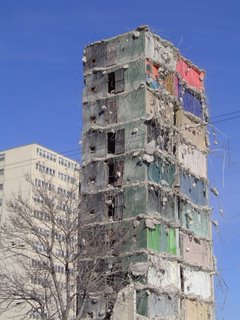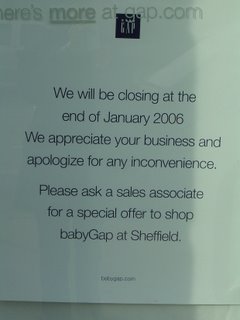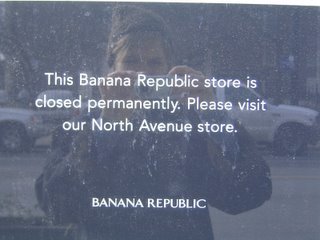
"I've come here for an argument."
"No you haven't."
"Yes, I have."
--Monty Python
More than 200 people packed the
Chicago Architectural Foundation's lecture room last Wednesday night itchin' for a fight.
Robert Bruegmann, author of
Sprawl: A Compact History, invited four critics to debate his book's premise: Sprawl is an inevitable and historic phenomenon, and, therefore, benign.
The four panelists were:
Douglas Kelbaugh, Dean, Taubman College of Architecture and Planning, University of Michigan
John Norquist, President of the
Congress for New Urbanism and former Mayor of Milwaukee
Brent Ryan, Assistant Professor, Urban Planning Program, University of Illinois, Chicago
Emily Talen, Associate Professor of Planning, University of Illinois at Urbana-Champaign and author of New Urbanism and American Planning: the Conflict of Cultures
The panel was moderated by
Daniel Friedman, FAIA, Director, School of Architecture, UIC.
First, Bruegmann got up and gave a 15-minute overview of the book. He was sober, polite, and steeped in research. I gave him high marks for wanting to investigate sprawl after he saw an article in an airline magazine and realized
no one disagreed with the notion that sprawl stinks. He thought that made it ripe for investigation.
But, his argumentwas faint, at least in the lecture. He showed how sprawl was a poor analytical term. He made some good observations about how sprawl is not necessarily an American phenomenon. Then, he got into a discussion of relative urban densities and pointed out some trends that suggested sprawl's natural, inevitable rise and fall in different parts of the world.
After Bruegmann's overview, each professor got up and said nice things about him. Then they argued against his book with words like "beauty" and "walkability" and the in-the-trenches "experience" of sprawl. They talked "gross densities" versus "net densities."
Ryan said he thought Bruegmann was fighting a "paper tiger" because no one in the new urbanist movement makes much headway against sprawl anyway. Then, Bruegmann got up and said "I agree with you on that." A lot.
By this point it was clear even to those of us in the cheap seats that no one was going to bust another's eye open. Professor Ryan (who got my vote for the evening's most cogent) probably said it best, when he said to Professor Bruegmann late in the evening, "I wish your book had been more of a polemic." Then, Ryan said, he'd have something to argue against. He'd have something to respond to within the way he goes about his urban planning.
For my money the comment of the night went to the old guy sitting in the back of the room who stood up and said, "So, tell me, who held a gun to all those people's heads and told them they had to buy those houses."
So, the academics tried to explain why beauty matters, and they dug themselves a bit of a hole. They got into real choices versus perceived choices. They floundered a bit.
Talen cited her her research that suggests people don't like living in sprawled areas, but by then she had so venomously and repeatedly shared her personal distaste for sprawl that she undermined the perception of objectivity in her research.
Kelbaugh helped her out a bit when he said, "Most people are happy where they live. You let people out of prisons, and they want to go back." But, I'm not sure that's the kind of response the old guy was searching for.
In other words, it's hard to critique people's hometowns and ways of life even if your Jiffy Lube looks just like mine.
And, that's pretty much how the anti-climatic evening unfolded. I will say, I'm glad I attended. I learned a lot by hearing the weaknesses in both sides of the argument. . . er, discussion.
Technorati Tags: sprawl,
planning,
Chicago
 Oh no. I just found out what's moving in to the space abandoned by Banana Republic, and I think I'd like to invite them back. (See previous post here.)
Oh no. I just found out what's moving in to the space abandoned by Banana Republic, and I think I'd like to invite them back. (See previous post here.) 
 The
The  I'm pleased to announce that
I'm pleased to announce that  The Chicago Historical Society, which is currently closed due to a major overhaul,
The Chicago Historical Society, which is currently closed due to a major overhaul,



 Sooo many worthy topics. So little time. I'll make this quick.
Sooo many worthy topics. So little time. I'll make this quick.
 I-GO, the member-based car share people, just
I-GO, the member-based car share people, just 
 Ben Joravsky at the
Ben Joravsky at the 
 Today's
Today's 






